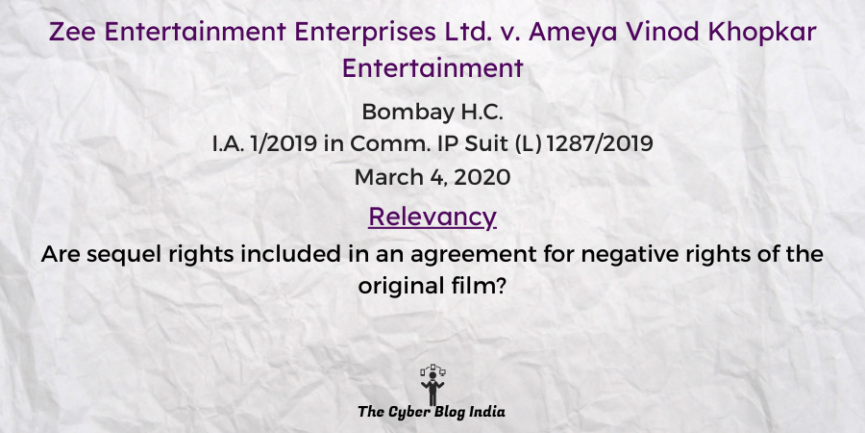Zee Entertainment Enterprises Ltd. v. Ameya Vinod Khopkar Entertainment

Zee Entertainment Enterprises Ltd. v. Ameya Vinod Khopkar Entertainment
In the High Court of Bombay
I.A. 1/2019 in Comm. IP Suit (L) 1287/2019
Before Justice B.P. Colabawalla
Decided on March 4, 2020
Relevancy of the case: Are sequel rights included in an agreement for negative rights of the original film?
Statutes and Provisions Involved
- The Copyright Act, 1957 (Section 13)
Relevant Facts of the Case
- Zee Entertainment Enterprises Limited wanted a permanent and ad-interim injunction to prevent the defendants from releasing the movie “De Dhakka 2”.
- They claimed it was a sequel to the original film De Dhakka, over which they claimed ownership. The case concerned both the rights to the literary work of the film and the trademark of the original film title.
- The defendants, who were the original film’s producers, had then executed an assignment deed assigning their rights to ZEE. The plaintiff gained all rights (including negative rights) to the film and future works through the assignment deed.
- As a result, the plaintiff claimed that the defendants had no right to create a sequel with a similar name. ZEE had acquired the rights in the deed, which was the primary reason.
Prominent Arguments by the Advocates
- The plaintiff’s counsel argued that according to media reports, the defendants used identical characters from the original film in the sequel. The impugned film has unjustly and unfairly copied the original movie, which solely and absolutely belongs to the plaintiff. This is explicitly mentioned under the deed of assignment. It included the title, characters, underlining literary work, and other elements. He further argued that the plaintiff received all rights to the film if we interpreted the assignment deed to its full extent. It also included its future works and the creation of a sequel.
- The defendant’s counsel submitted that under the assignment deed, the plaintiff’s negative rights do not include any rights to the title “De Dhakka” or the right to make a sequel to the original film. They added that the negative rights to the movie “De Dhakka” included exhibition, distribution, and exploitation of theatrical and non-theatrical rights, commercial rights, satellite transmission in any form, and even mobile rights. “De Dhakka 2” features a new plot and concept. He further argued that there was no basis for granting any relief to the plaintiff. Besides, the ad-interim remedy should also be denied.
Opinion of the Bench
- The bench examined the text of the assignment deed and stated that the terms “sequel rights” do not exist anywhere in the deed. We cannot say that the defendants also gave the plaintiff an interest in the sequel.
- The defendants intended to assign only the “Negative Rights” of De Dhakka, explicitly mentioned in the assignment deed. As a result, it’s not possible to deduce that they assigned or intended to assign any other rights.
- Furthermore, the judge relied on the defendant’s assertion that De Dhakka 2 had an entirely distinct script, dialogues, premise, characters, locations, and music.
- Subsequently, the judge reviewed the language of the deed. The judge concluded that there was no prima facie ground for an injunction to be granted.
Final Decision
- The bench rejected the application for an injunction.
